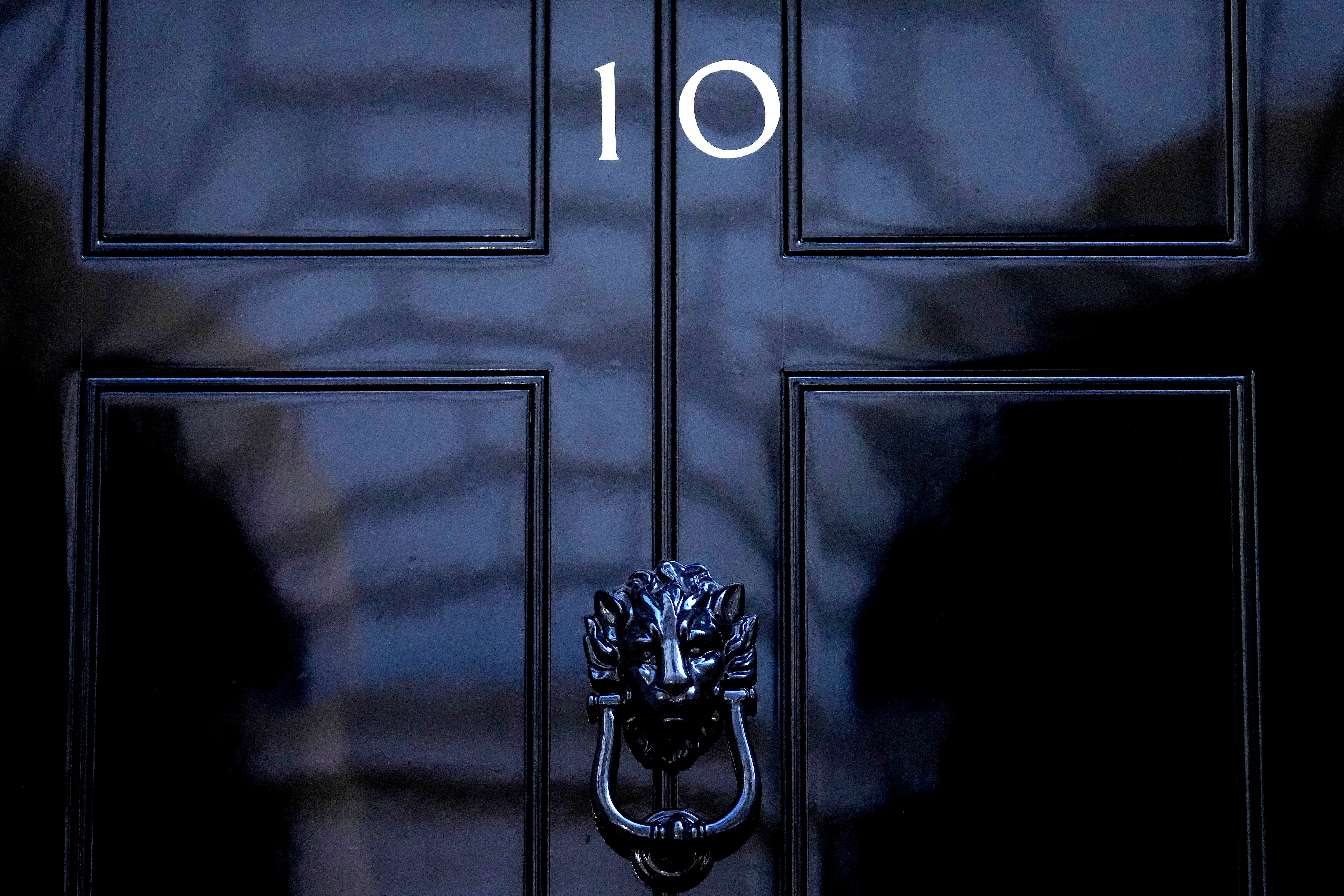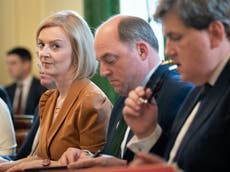Can Liz Truss survive the coming storm?
She has been a minister for a decade and at the cabinet table for eight years, but it is still hard to predict what she will do in the top job, writes John Rentoul


For someone who has the most cabinet experience of any new Conservative prime minister since Alec Douglas-Home, Liz Truss remains something of an enigma. The other day, I looked her up in all the memoirs, diaries and instant histories covering the past 10 years of British politics that I could find. The mark she has left on these early drafts of history is light indeed.
One of the most colourful accounts is of her two years as a junior minister in the Department for Education, recorded by David Laws, a Liberal Democrat minister in the same department. Apart from impressing him with her ambition, energy and resemblance to Margaret Thatcher, she left no legacy to speak of.
The main excitement of that period was a clash between Ms Truss and Nick Clegg, the deputy prime minister, over nursery schools, which she boasted about in the final hustings in London last week. In 2013, she wanted to “allow nurseries to have much worse ratios of staff to children, even though the consultation showed this is mind-bogglingly unpopular”, Mr Laws wrote. “Liz is ‘not for turning’.”
It was an odd battle to fight, and Ms Truss lost it. But she was forceful enough to appeal beyond the department to Mr Clegg. He refused to support her, and Mr Laws said she told him privately that David Cameron and Michael Gove, the education secretary, encouraged her to take her case to cabinet. She was still trying to push the policy when she was promoted to the cabinet, as secretary of state for the environment, food and rural affairs, in 2014.
The idea of changing childcare ratios to allow early years staff to look after more children is one of those bad policies that will never die, and it resurfaced in yet another government consultation in July this year. Nadhim Zahawi, the education secretary, and Will Quince, his junior minister, said it would allow nursery providers more “flexibility”.
To be fair to Ms Truss, it is hard to make a difference in junior ministerial office. Chris Mullin’s diaries of his time as a junior minister in the Blair government, A View From the Foothills, provides an entertaining account of the peculiar powerlessness of a parliamentary under-secretary of state.
But her record as a cabinet minister is hardly that of “delivery, delivery, delivery”, as she claimed in the video launching her leadership campaign, either. She was at Defra for two years, where the only thing she is remembered for is that Conservative Party conference speech about cheese imports and pork markets. Theresa May promoted her to justice secretary for a year, where she got on so badly with the legal establishment that she was demoted to chief secretary to the Treasury. She lost her status as a full cabinet minister, retaining the right to attend cabinet as deputy to Philip Hammond, the chancellor whom Ms May distrusted.
At this time, she talked a bracingly free-market game, including to journalists, but I had the impression that Mr Hammond would not allow her near any substantial policy decisions. It was during these two years that she was recorded saying that “there’s a fundamental issue of British working culture”, which was that people wanted “easy answers”, were too ready to blame Europe or migrants for problems, “but actually what needs to happen is more graft”.
The contrast with the career of her first secretary of state is instructive. She has served in three of the same departments as Michael Gove. He had a striking record in each. In education, he hugely expanded New Labour’s academies programme and launched free schools. As justice secretary, he started humane prison reform, even if his job was made easier because some of it consisted of simply reversing the policies of Chris Grayling, his predecessor, who limited prisoners’ access to books. Later, at Defra, he turned out to be an energetic and imaginative green advocate. Ms Truss, by contrast, had little to show for her time in any of those departments.
Truss is probably the least well-known person to become prime minister since John Major
It was Boris Johnson who made it possible for her to succeed him. By appointing her international trade secretary he allowed her to take the credit for “negotiating trade deals”, which was a creative way of describing the necessary post-Brexit bureaucracy of duplicating the trade terms the UK had enjoyed as a member of the EU. Two years later, as Rishi Sunak’s handling of the pandemic response made him the most popular politician in the country, Mr Johnson was sufficiently spooked that he promoted Ms Truss to foreign secretary in the hope that a leadership rival would weigh down his overmighty chancellor.
The plan failed if it was intended to keep him in office, but it worked from Ms Truss’s point of view. Although Johnson might have choked when Ms Truss succeeded where he had failed as foreign secretary, in negotiating the release of Nazanin Zaghari-Ratcliffe and Anoosheh Ashoori in March this year. The mechanics of that diplomatic triumph remain obscure but, if we are judging Ms Truss’s effectiveness in the mysteries of government, it was significant.
Not that many prime ministers come to office with much of a ministerial record, however. Even Mrs Thatcher had only one parliamentary term as education secretary, 1970-74, when, as Charles Moore’s biography makes clear, she regarded schools as essentially the responsibility of local authorities. She saw her job as being to try to preserve a few schools from the march of comprehensivisation, and to defend the department’s budget, which she did successfully.
John Major was not long in cabinet before he came to the top job. Tony Blair and David Cameron had no ministerial experience at all, but becoming prime minister from opposition is an entirely different matter. Being leader of the opposition is a highly exposed and testing job, in which a candidate prime minister has to set out a detailed manifesto.
Ms Truss, on the other hand, has managed to get through a party leadership campaign without setting out what she will do about the crisis facing the country. Not only that, but she has given away little of herself, apart from some guff about being “from Yorkshire” and having been to a school that let some (other) pupils down. Given the attention paid to Boris Johnson’s private life, it is surprising how little has been paid to the controversy over her affair with Mark Field, the former Conservative MP, in 2004-05, which threatened to derail her selection for her safe Norfolk seat in 2009. The only time I heard the issue come up was at the hustings in Perth on 16 August, when a man asked Rishi Sunak a question, prefaced by saying: “It would be good to see you in No 10 as a man with family values, traditional family values.”
She is probably the least well-known person to become prime minister since John Major, who had been catapulted from chief secretary to the Treasury, then a full member of the cabinet, if a junior one, to foreign secretary and then chancellor only the year before. Even Ms May, whose personal life was quite closed, had a notable six-year record as home secretary. Nevertheless, there are two things that we can deduce from Ms Truss’s career to date.
One is a negative one, a dog that didn’t bark. Which is that Ms Truss has survived. One of the often overlooked qualities in an effective politician is the avoidance of mistakes. She hasn’t made many. Despite the setback of demotion in 2017, she has stayed in ministerial office longer than anyone else. Many Tory MPs (and journalists) expected her leadership campaign to falter. She was in third place in the first four rounds of MPs’ votes, and made it into the final two only when Penny Mordaunt’s campaign faltered at the end.
The other is a positive one, which is that she understood what she needed to do to win. Her supporters managed to sow enough doubts about Ms Mordaunt to stall her campaign as it neared the finishing line, then Ms Truss disposed of Mr Sunak with a ruthless retailing of what the party members wanted to hear.
These two qualities suggest that she will do what it takes to survive the next test, which is to win the general election. That is why we should be sceptical about the common interpretation, based on taking her leadership campaign at face value, that her small-state conservative dogma will be unpopular with voters who want the government to protect them. Her policies over the next two years are likely to be whatever the swing voters of the 80 marginal seats that constitute the Conservatives’ majority want them to be.
The question might not be whether she has the ability to be an effective prime minister, but whether any prime minister could survive the storm that is about to break over the British economy.






Join our commenting forum
Join thought-provoking conversations, follow other Independent readers and see their replies
Comments